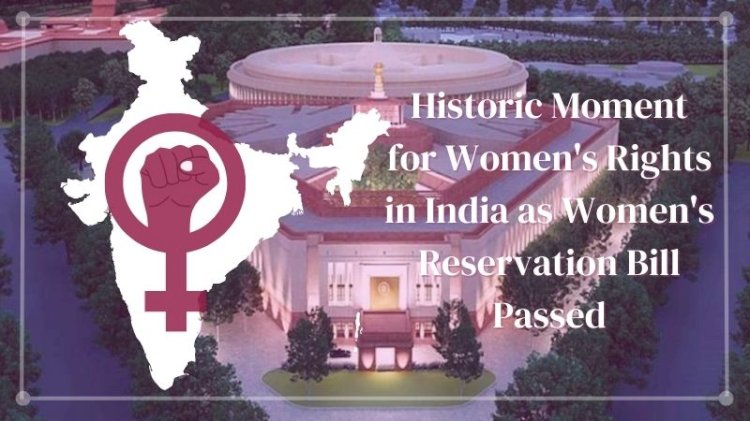Historic Moment for Women's Rights in India as Women's Reservation Bill Passed
The Nari Shakti Vandan Adhiniyam, or the Women's Reservation Bill, was passed by the Lok Sabha on September 20, 2023, with 454 votes in favour and two against. The bill seeks to provide 33% reservation for women in the Lok Sabha and state assemblies. The bill has been welcomed by many, who say that it is a historic moment for women's rights in India. Others have expressed reservations about the bill, saying that it does not go far enough to address the root causes of gender inequality. It is important to address the concerns of critics and ensure that the bill is implemented in a way that benefits all women, regardless of their background.
By Shreya Rajvanshi Gangal

On September 20, 2023, the Lok Sabha, the lower house of the Indian Parliament, passed the Nari Shakti Vandan Adhiniyam, or the Women's Reservation Bill, with 454 votes in favour and two against. The bill, which seeks to provide 33% reservation for women in the Lok Sabha and state assemblies, has been a long-pending demand of women's rights activists.
Pros and Cons of the Bill
Pros:
- The bill is expected to increase the representation of women in Indian politics, which has historically been dominated by men.
- It is also seen as a step towards achieving gender equality in India.
- The bill is expected to empower women and give them a stronger voice in the decision-making process.
Cons:
- Some critics argue that the bill will lead to the reservation of seats for women, regardless of their merit.
- Others argue that the bill will benefit women from privileged backgrounds more than women from marginalized groups.
- There is also a concern that the bill may lead to an increase in violence against women, as they enter the male-dominated world of politics.
Reactions of Citizens and Parliament Members
Citizens and parliament members have expressed a mixed bag of reactions to the passage of the Nari Shakti Vandan Adhiniyam. Many have welcomed the bill, saying that it is a historic moment for women's rights in India. Others have expressed reservations about the bill, saying that it does not go far enough to address the root causes of gender inequality.
Reactions from Citizens
- "I am so happy that the Women's Reservation Bill has finally been passed. This is a huge victory for women's rights in India." - 25-year-old student
- "I am not sure if the Women's Reservation Bill will be effective in increasing the representation of women in politics. I am worried that it will simply lead to the reservation of seats for women, regardless of their merit." - 40-year-old homemaker
- "I am concerned that the Women's Reservation Bill may lead to an increase in violence against women, as they enter the male-dominated world of politics. However, I believe that the bill is still a step in the right direction." - 55-year-old retired government employee
Reactions from Parliament Members
- "The passage of the Women's Reservation Bill is a historic moment for India. This bill will empower women and give them a stronger voice in the decision-making process." - Prime Minister Narendra Modi
- "The Women's Reservation Bill is a regressive step that will undermine the quality of democracy in India. It is also unfair to men, who will now have less chance of being elected to Parliament." - Rahul Gandhi, leader of the Indian National Congress
- "I am happy that the Women's Reservation Bill has finally been passed. However, I am disappointed that the government has not done more to address the concerns of critics. For example, the government should have provided more safeguards to ensure that women from marginalized groups can benefit from the bill." - Mayawati, leader of the Bahujan Samaj Party
Conclusion
The passage of the Nari Shakti Vandan Adhiniyam is a significant step towards achieving gender equality in India. However, it is important to address the concerns of critics and ensure that the bill is implemented in a way that benefits all women, regardless of their background.
What's Your Reaction?


















